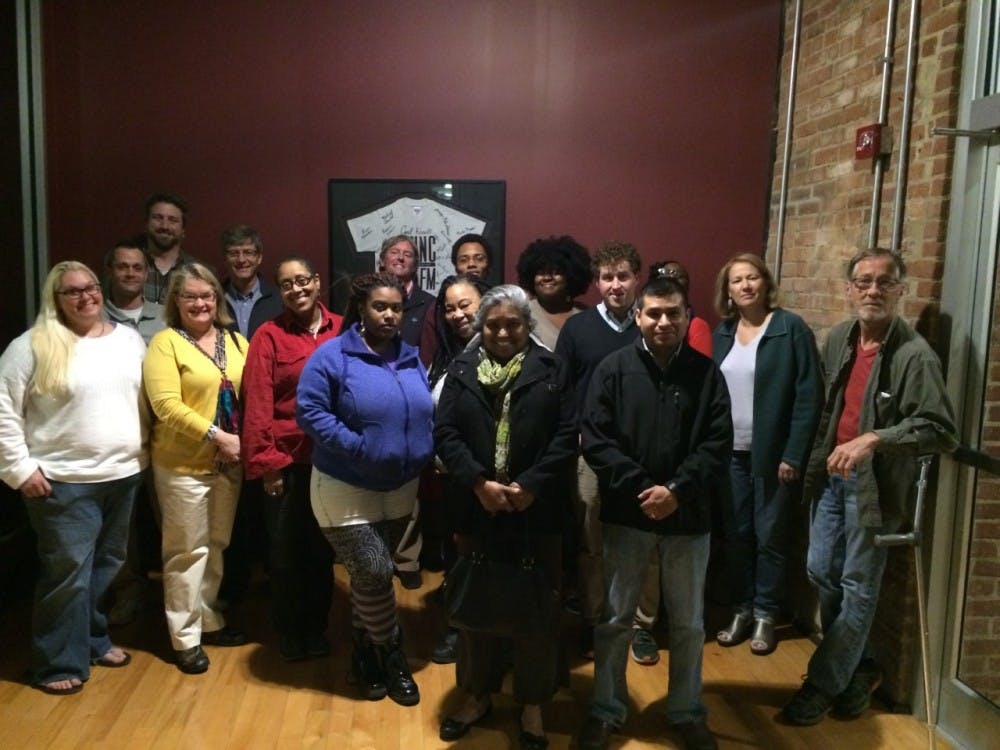A new initiative called "Storymakers" is giving Durham residents a voice and promoting unity among them.
"Storymakers" is a public media initiative that aims to provide a space for Durham community members to discuss the forces that unite and divide them and share those perspectives on public radio. John Biewen, director of audio programs at the Center for Documentary Studies at Duke and a former radio producer, created the project in response to a call from the Association of Independents in Radio, which wanted to create programs that could engage local radio stations with their communities.
“I got very interested in the possibility of combining my experience as a producer and a teacher as a way of not just giving voice to people from a community, but also handing the tools of production over to them,” Biewen said.
As part of the program, fifteen Durham residents are invited to weekly “Story Circles” meetings in which they discuss topics such as race, class and inequality. These conversations are used as the basis for documentaries that will air on WUNC, a radio station in Chapel Hill. Biewen noted that a key feature of the project is letting Durham residents play a role in developing and producing the documentaries.
For nine months, Biewen has been organizing conversations and providing tools and training to Durham residents. The project has reached its final stages, and the stories are expected to air on WUNC radio in the coming weeks.
Podcasts of many of the conversations are also currently available at Duke’s Center for Documentary Studies audio collection “Scene on Radio."
The “Storymakers” project was one of fifteen proposals selected out of over 200 from across the country by the Association of Independents in Radio. Biewen noted that the project enables Durham residents to share their perspectives on social issues relevant to the Durham community.
Biewen explained that by starting the project, he hoped to put microphones in the hands of regular people and bring residents together to hear one another’s stories. He added that he also wanted to see if group discussions between everyday Durham residents could portray a different picture from what was commonly shown in the media.
“[One of the goals] was to see if we could hear stories and conversations that sound different from what a detached reporter might find," said Biewen. “I think that there’s something very interesting qualitatively in the sound of those conversations that is different from what a professional reporter usually would be able to capture.”
Biewen works with Spirit House, a cultural arts and organizing center in Durham, to engage the Durham community in the project. So far, Biewen said that he believes he has been successful in creating a body of work that shares the perspectives of communities that the public media does not typically reach.
“In this case, [the project] was designed to create a series of stories looking at something that is of interest right now in the United States, which is these deep divisions along the lines of race and class and to have people in one community conceive and produce stories that explore those questions," he said.
Durham residents who are participating in the project noted that they appreciate the opportunity to delve more deeply into the lives and experiences of their neighbors through safe and open discussions.
“I got to see another aspect of the people I was talking to,” said Kimani Hall, a recent industrial design graduate from North Carolina State University. “I got questions answered that I probably wouldn’t have asked them otherwise, and it made me start to think and feel similarities to my own situation.”
Because the Storymakers platform draws in a diverse Durham crowd, project participants have been eager to learn about the struggles and perspectives of their fellow residents.
“The best things I learned were from listening to other people’s stories and what they have been through,” said Katt Ryce, a 35-year-old senior resident leader and staff trainee at TROSA, a Durham-based substance abuse recovery program. “It was just very humbling for me to hear all these people’s stories and where they’ve come from.”
Get The Chronicle straight to your inbox
Signup for our weekly newsletter. Cancel at any time.

